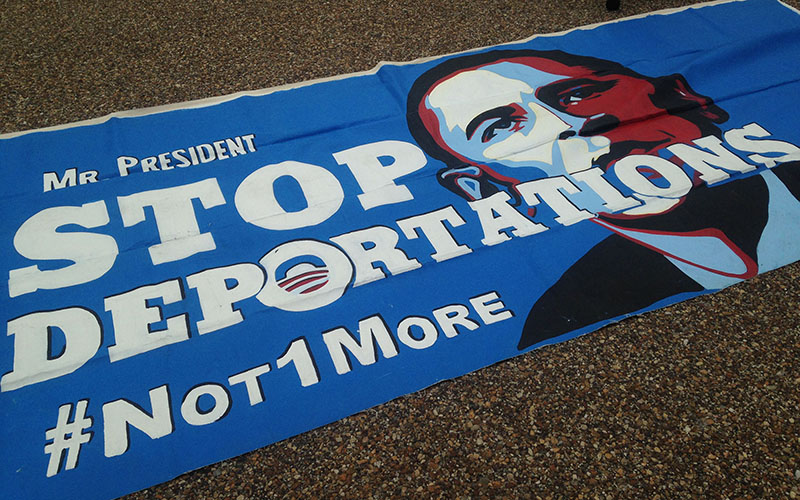
President Barack Obama unveiled the Deferred Action for Childhood Arrivals three years ago, to protect people brought to this country illegally as children. Attempts to expand the program last fall stalled in the face of state legal challenges. (Photo by Whitney Ogden)
WASHINGTON – The number of people applying for deferred deportation protection, and the number reapplying, have both risen as the Deferred Action for Childhood Arrivals program nears its third anniversary, new data shows.
A report Tuesday by the Migration Policy Institute said that 83 percent of the 430,396 people eligible to renew their deferrals had done so as of March 31.
“I think that this number signifies people realizing the benefits and protection DACA grants them,” said Angelo Mathay, an associate policy analyst with the institute.
The report estimated that about 32,000 immigrants in Arizona had been granted deferrals and are now eligible to apply for renewal. Another 13,000 children in the state could be eligible to apply in the future, the report said, once they reach the minimum age of 15 and if they meet other requirements.
But even as numbers are up, the report said barriers to participation remain, including lack of outreach, confusion about the renewal process and the relatively high cost of the application fee.
DACA, launched in August 2012 by the Obama administration, aimed to provide temporary protection from deportation to people who were brought to this country illegally as children.
Young immigrants could apply if they had been in the country at least five years, had no criminal record, were in school or the military, or had graduated high school, among other requirements. If they paid the application fee and passed all the checks, they could get a work permit and have possible deportation deferred for two years, which could be renewed.
About 1.6 million people were estimated to be eligible at the time, and the institute report said Tuesday that about 750,000 had applied since the program began.
The first applicants had to start reapplying last year, as their two-year deferrals expired. Renewal is only available to those who have been in the U.S. continuously since submitting their most recent request and who meet the other requirements of the program.
President Barack Obama announced plans late last year to expand the program to a three-year deferral, and to include parents of some DACA children, but that effort has stalled in the face of legal challenges from states.
But the original program remains intact – along with some of the original problems.
Mathay said the most significant barrier to participation is the application fee, which has remained at $465 since the program was first launched, and is assessed on application as well as re-application. Advocates have urged U.S. Citizenship and Immigration Services to reduce the fee, to no avail.
DACA recipients who are planning to seek renewal have a 120-day window before their current deferral expires to do so. If not, and their deferral lapses, they could lose work status, lose their legal protections and face other problems.
Randy Capps, director of research for U.S. programs at MPI, said that granting work status benefits more than just the immigrants getting the work permits. Particularly in states with largest Mexican immigrant populations, like Arizona, a big benefit of DACA is that it allows recipients to contribute to the local economy, he said.
“There has been a little bit of research suggesting that there’s a significant bump up in earnings (for those with work permits), and when there’s more earnings those people spend more in the local economy,” Capps said.